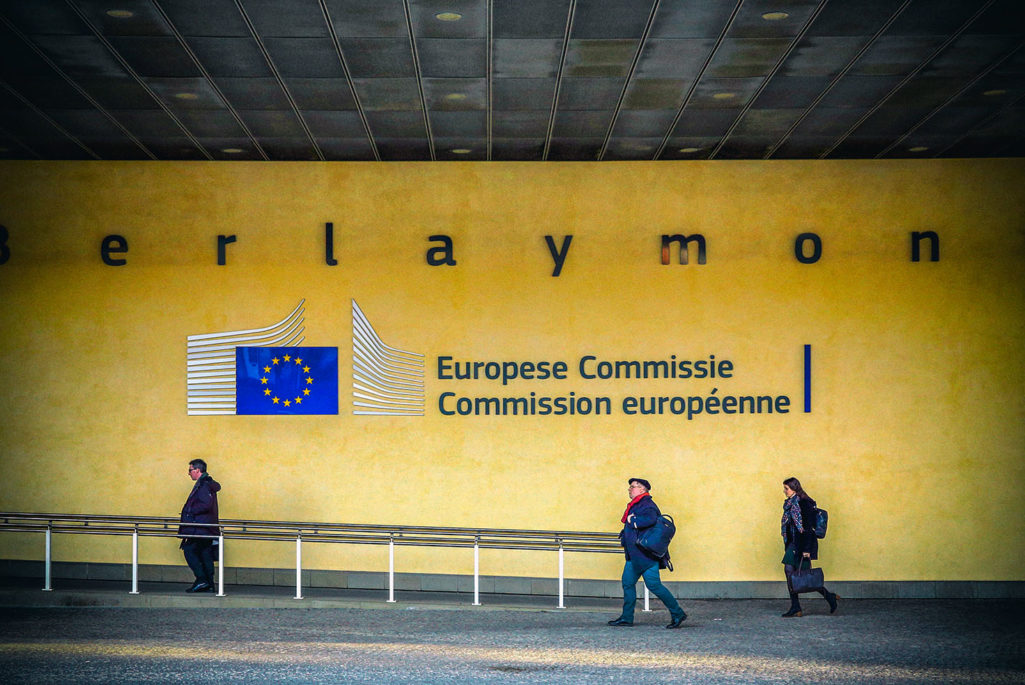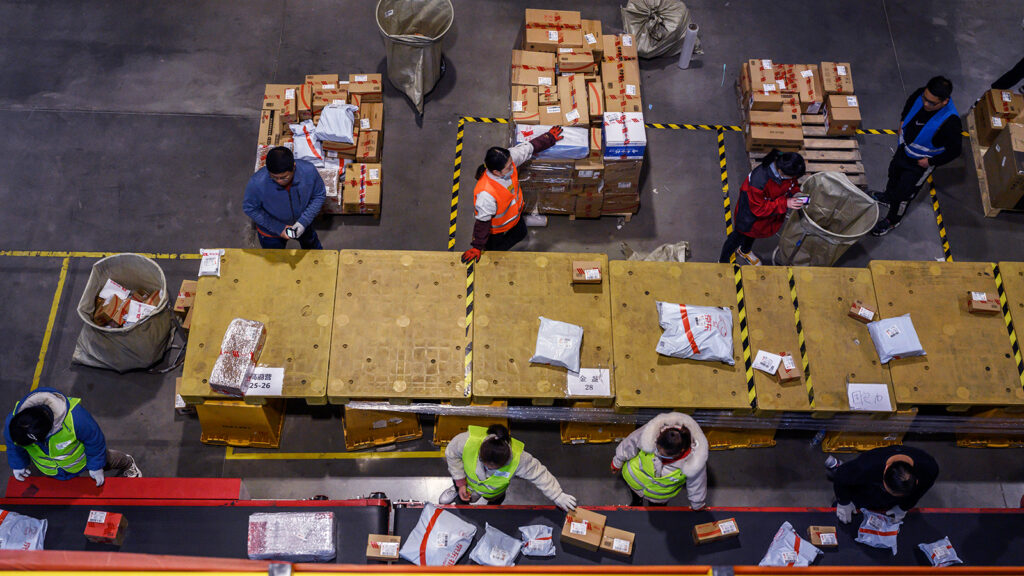
People walk under signage at the European Commission headquarters building.
Photo: Carl Court/Getty Images
Should intellectual property protection be an element of responsible supply chains? The European Commission believes so and is seeking to move this topic up the agenda with an initiative targeted at incorporating IP protection into supply chain management.
There are good reasons to do so: Consumers face myriad health and safety risks from counterfeit products or parts and companies lose valuable competitive advantage if IP and trade secrets are compromised.
The EC initiative encourages companies to adopt a more holistic approach to responsible supply chain management to allow for greater integrity, quality and customer confidence in the origin of branded and IP-intensive products.
A recent webinar hosted by the Center for Responsible Enterprise And Trade (CREATe.org) offered insights into the initiative. CREATe.org’s Chief Operation Officer, Craig Moss, talked with Jean Bergevin, head of the Intellectual Property and Fight Against Counterfeiting for the European Commission, and his colleague, policy officer Stéphanie Martin.
Q. Tell us about this responsible supply chain initiative. How did it originate and why?
A. Jean Bergevin: Intellectual property is recognized as being vital to the success and innovation of companies and countries. In 2014, the European Union released an Action Plan for the Enforcement of Intellectual Property Rights. This plan focused on 10 actions dedicated to commercial-scale IP infringements. Action 2 is centered on “Integrity of Supply Chains,” an important element of broader IP protection. It is also a key component of the “Follow the Money” package, which was announced in the Single Market Strategy of Oct. 28, 2015. This action addresses the IP challenges associated with today’s highly fragmented, vast and complex supply chains. Our goal is to help companies better address issues associated with counterfeits and other IP infringements.
Stéphanie Martin: We are facing increased challenges due to vulnerabilities associated with global supply chains.
Q. How do supply chains factor into IP protection?
A. Stéphanie Martin: We are facing increased challenges due to vulnerabilities associated with global supply chains. The reason is because supply chains are very complex, there are a lot of actors and a range of intermediates who are involved. As a result, companies are facing transparency issues and infringers are taking advantage of these vulnerabilities.
A. Jean Bergevin: In addition, many companies have challenges around counterfeit and gray-market goods appearing in their legitimate supply chain. It may be authorized suppliers that are overproducing or using unauthorized subcontractors. It may also be legitimate distributors or channel partners that are handling counterfeits,– knowingly or unknowingly.
Q. What steps have you taken to this point?
A. Stéphanie Martin: In June 2015, the European Commission held a workshop that brought together European Commission officials, representatives from the OECD, academia and the business community. It focused on two aspects of integrating IP protection into responsible supply chains. First, we discussed how companies can include IP protection management systems in responsible supply chain management. Second, we looked at the utilization of cost-effective track and trace technology to help curb counterfeits by tracking authenticity of parts and finished products.
Q. Many EU and U.S. companies have responsible supply chain initiatives in place already. What can they expect with your recommendations?
A. Jean Bergevin: We tried to change the narrative of enforcement policy from one of repression to one of a more holistic approach. Ideally, we would like to see IP protection added to existing responsible supply chain programs so that companies do not need to start something entirely new. Many companies already have responsible supply chain programs that are looking at environmental and labor issues. IP protection can be integrated into those existing programs. We are also interested in getting everyone involved in the business, not just the right holders, but all the different intermediaries both upstream and downstream.
A. Stéphanie Martin: I would like to add that it is not about having a reactive approach, but about taking a preventative approach. It’s about building trust for consumers and increasing the controls in place to reduce or eliminate counterfeits in legitimate supply chains.
Q. How are you looking to achieve supply chain integrity for IP Protection?
A. Stéphanie Martin: Supply chain integrity involves fostering a culture of transparency, responsibility and fairness throughout the supply chain. Also key is integrating IP protection into business practices such as monitoring, codes of conduct, better tracking, training of employees and other business processes. We also believe it is important to involve every actor across the supply chain.
Q. Tell us about the public consultation that is underway and how people can get involved.
A. Stéphanie Martin: In last year’s workshop, participants contributed to the development of a survey that forms the public consultation that we launched on Dec. 17. The survey for the consultation focuses on the mechanisms developed by companies to secure their supply chains and thereby protect their intellectual property. We encourage companies to participate in the public consultation. We will communicate about our recommendations in 2017.
Q. Any final comments?
A. Jean Bergevin: We believe our approach, and that promoted by CREATe, offers a win-win strategy for all parties. Rightholders gain effective IP protection and other benefits related to supply chain integrity. For consumers, responsible supply chains would ensure safety, authenticity and integrity of products. Suppliers can benefit through transparency, which promotes fair business practices throughout supply chains. Finally, for society at large, responsible supply chains promote a stronger rule of law and fairness for all.
To learn more about the initiative, visit the European Commission’s IP page. Click here to participate in the public consultation.





